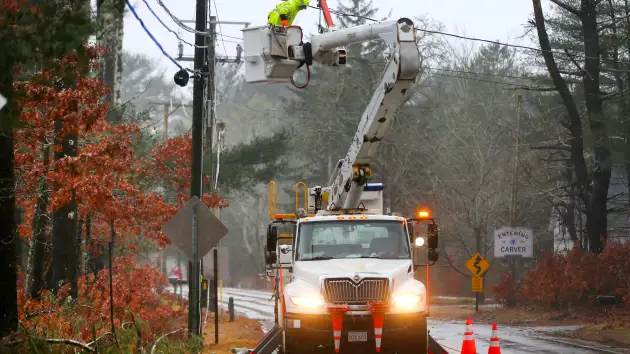Powerful winds knocked down trees and caused power outages in the South Shore, including a large pine tree that fell on power lines on Carver Road in Plymouth, MA on Feb. 18, 2022, where utility crews work on repairs.
Article Source: CNBC
Article Link: https://www.cnbc.com/2023/11/08/maine-votes-to-keep-investor-owned-electricity-companies.html
Photo Credit: John Tlumacki / Boston Globe / Getty Images
Maine’s power grid is staying private.
Voters on Tuesday rejected a ballot measure that would have replaced Maine’s privately owned, for-profit electric utilities with a single publicly owned, nonprofit utility called Pine Tree Power.
It is not the first time that Mainers’ push for a publicly owned energy grid has failed. In 1973, voters struck down the creation of a Maine Power Authority, which would have put the power supply in the state’s hands. And in 2021, Democratic Gov. Janet Mills vetoed a bill from the state legislature to establish Pine Tree Power.
If the ballot measure had passed this time around, the plan was for Pine Tree Power to buy out the two companies that currently run the state’s energy grid: Versant Power, owned by Canadian utility Enmax, and Central Maine Power, a branch of Avangrid, which is owned by Spanish electric utility Iberdrola.
But the utilities companies, along with some public officials including the governor came out against the proposal for the massive amounts of debt and time that a transition to public energy may require.
The utilities estimate that Pine Tree Power’s takeover would have put the state in $13.5 billion of debt. And Maine’s Office of the Public Advocate, which said it was neutral on the issue, estimated that the process of getting Pine Tree Power up and running would span five to 10 years.
″Maine voters did their homework, they did their research,” said Willy Ritch, the executive director of Maine Affordable Energy, an Avangrid-sponsored voting coalition in a statement Tuesday night. “They rejected billions of dollars in debt and they rejected the risk and uncertainty that came with it.”
As a publicly run organization, Pine Tree Power would not have been subject to the over $16 million corporate income taxes that Central Maine Power and Versant Power have been jointly paying, according to Maine’s Office of the Public Advocate, which previously stated its neutrality on the ballot measure.
A group of Maine mayors signed an open letter in October voicing concerns about Pine Tree Power and its tax exemptions, which, they said, would leave cities “to make up the difference” via higher property taxes or cuts to public services.
“It’s better to work together to achieve our energy goals rather than risk massive amounts of time and money on such a risky proposal,” Judy Long, a spokesperson for Versant Power, told CNBC on Tuesday before the final vote count.
Environmental advocates and other Maine representatives supported Pine Tree Power as an opportunity to transition to clean energy and save consumers money.
“The arguments against this proposal are all coming from a $40 million misinformation campaign entirely funded by the utilities because they’re scared of losing profits,” said Lucy Hochschartner, a spokesperson for Pine Tree Power on Tuesday before the final vote count.
Success stories elsewhere
It’s a rare move to kick out private electric companies in favor of a public utility, especially on the state level. Nebraska is the only state in the country with an electric grid that is 100 percent powered by public utilities, which have been in place since the 1930s.
Public electricity is more common on the municipal scale.
Large cities like Los Angeles and Seattle both run on publicly-owned power grids. The Hawaiian island of Kauai transitioned to a collectively owned electric utility company in 2002 after acquiring the for-profit company that previously operated there. In New York, the Long Island Power Authority has run the power grid of Long Island since 1986.
In some of those places, public power has offered clean energy benefits.
The Kauai Island Utility Cooperative offers a blueprint for how public energy can spearhead renewable investment. The KIUC generates the majority of its energy from renewables and plans to transition the rest of it by 2033. In the meantime, Hawaiian Electric, which runs the rest of the state’s power grid, produced under a third of its electricity from renewables last year.
Publicly owned power does not automatically translate to cleaner power, though. Despite having a roughly 70-year-old public power grid, Nebraska still relies heavily on coal.
Other Maine supporters of Pine Tree Power, including a nurse’s union, pushed for it as a money-saver for consumers by putting the ratepayers in charge of their own electric utility.
That worked in Kauai, where electricity comes at some of the lowest rates in the state. A 2020 report from London Economic International commissioned by Maine’s Public Utilities Commission found that the creation of a “consumer-owned public utility” could lead to higher rates in the short term that ultimately level out in the long term.

